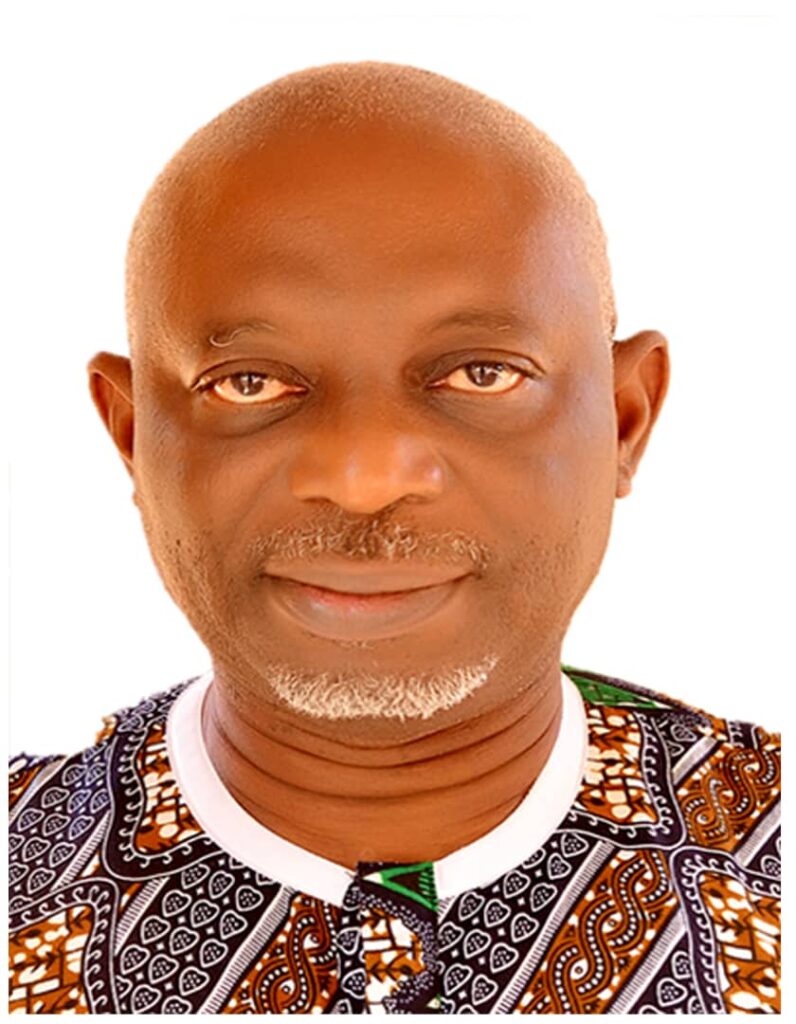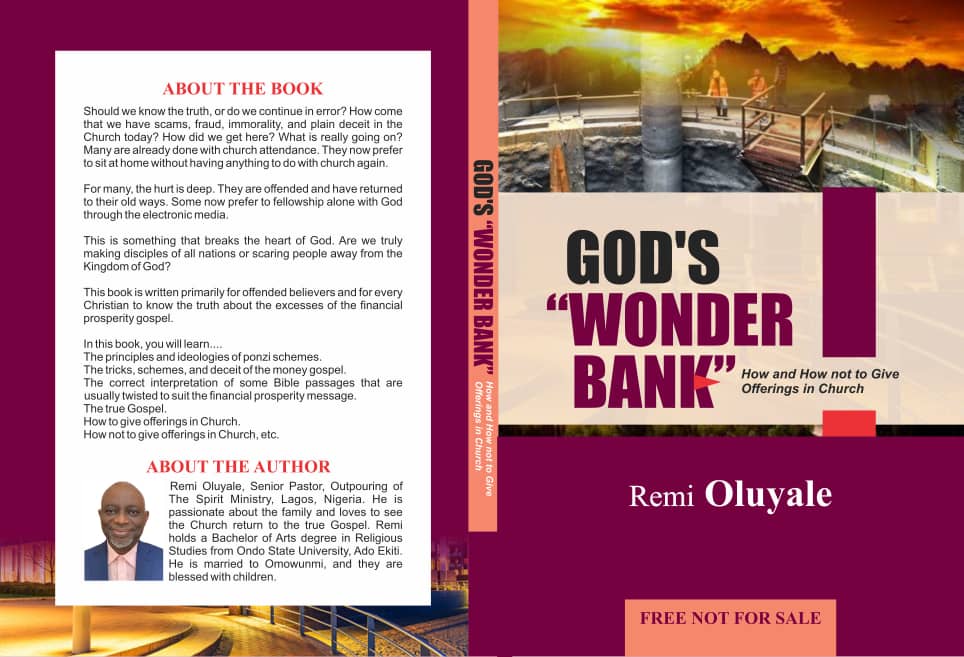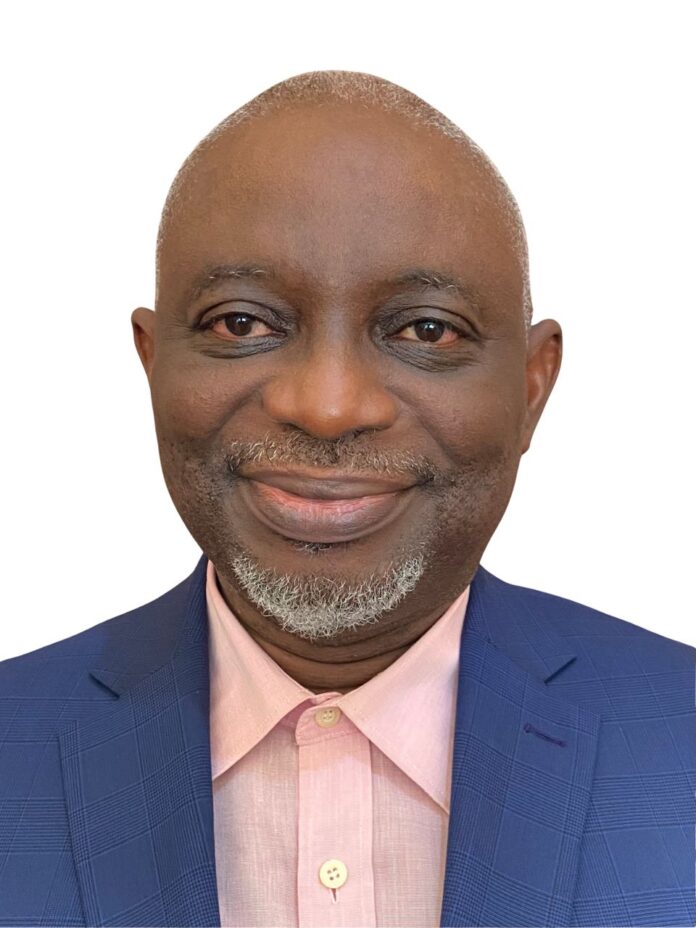Rev. Remi Oluyale, the author of the wide circulating expository book, GOD’S “WONDER BANK”, being distributed free in churches, at ministers conferences and to gospel ministers across Nigeria has opened the lids on some of the serious issues he raised in the book, which he identifies as being responsible for many of the rots and some of the unwholesome practices in many churches today. In this interview with Christian Benefits’ Olaide Afolayan about the book, Oluyale, a seasoned scholar, a respected theologian, and a builder of ministers, reveals some of the dangers bedeviling many Nigerian churches today, including the lukewarm church attendants whom he calls the offended brethren in the flock and the prosperity gospel pitfalls, among other malaises affecting many Nigerian churches today. Excerpts.
How would you like to be introduced?
You can address me as Pastor Remi or Brother Remi. The title “brother” is higher than any other title. You’re not supposed to be a pastor without first being a brother.
How did you get to know Christ?
I gave my life to Christ in 1981, but there was no follow-up, so I didn’t grow. In 1983, I gave my life to Christ again, and since then, I’ve been moving forward.
Share with us your walk with Christ since you accepted him fully in 1983 to date.
After being born again in 1983, I attended Oyo State College of Arts & Sciences (OSCAS), Ile-Ife, now in Osun state, where I found myself in the midst of ministers. From 1984, I’ve been going out to minister in crusades and outreaches in villages. Some brethren and I started a ministry in 1985, going for mission works, establishing churches in villages, grooming and raising leaders, and handing them over to existing ministries around their localities. We did several of these under the ministry we named Living Jesus Ministry under the leadership of Rev. Olusola Areogun.
Briefly, share with us your lifestyle before accepting Christ.
My lifestyle was religious because I grew up in the Christ Apostolic Church (CAC), but I wasn’t born again then. I was religious, keeping all the commandments, but without walking with the Lord. Let me put it this way: I was merely a moralist before I accepted Christ in my life.
Specifically, tell us how you encountered Christ from a mere moralist.
I was invited to a crusade of the now late Bishop Caleb Oloyede at the Police Ground, Mokola, Ibadan. When an altar call was made, I went out and dedicated my life to Christ. After the altar call, I knew something had happened to me, but I couldn’t say what it was. I just knew I was so joyful and full of light. It was when I started growing in Christ that I realized what happened to me that day was the joy of salvation. That was in December 1983. I joined the Christian Union and lived with the union leaders in the same accommodation. From there, I started attending the fellowship.
How and when did Outpouring of The Spirit Ministry appear along your walk with Christ?
After my university education, I served in the National Youth Service Corps (NYSC) in Jos, Plateau State. After concluding the mandatory one-year NYSC service, I stayed in Jos for a while before returning to Lagos in 1985. I started Outpouring of The Spirit Ministry in 1997 in Mushin, Lagos.

Specifically, what is the mandate of your calling to ministry?
The mandate of my calling is to raise faithful disciples and mature saints for the work of the ministry. All our church members are ministers wherever they find themselves, including the marketplace. We see the marketplace as a platform for ministerial work, not just pulpit ministry. We are raising our members for personal ministry like hospital ministry, prison ministry, campus ministry, etc, which we are going to support and back up. The minister would be personally responsible for his vision. We will announce in the church for people who would like to join or finance the vision. Some of our members are already discovering their ministry. We encourage all our members to do something to serve the Lord, just like Jesus said, anyone who wants to be his disciple must deny himself, take up the cross, and follow him. Your cross is your divine assignment. Jesus carried his cross too; the work of redemption was his divine assignment. My own cross is my assignment that I’m doing now, and I do it with everything within me. My various platforms and resources are the tools for my cross; my divine assignment to raise faithful and mature saints who will be useful for the work of the ministry.
What is your perspective on running a ministry inside another ministry?
I don’t even have a church. The church I lead belongs to God. So people can have a ministry within my ministry. We would groom them, back them up, support them, and encourage our members to join them. I do not own the church. I don’t treat it as my property. If God tells me today to move to another country to do his work, I won’t look back. The ministry belongs to the owner, God. The pastors serving with me know that if they have a calling to go start a church, I’ll support them. I’ll even ask people to go with them. I belong to a group of ministers called New Covenant Ministry International (NCMI) with the head office in South Africa. We hold a yearly training in Nigeria. In NCMI, we don’t believe in church branching. We believe in raising sons, planting churches, and putting saints who are mature and have paid their dues in charge of the churches. The church will eventually be seeded to them. We do not see ministry as a platform for making money but as an opportunity to serve God.
How do you see the problem of lack of discipleship in many churches today?
The problem is the minister’s approach, ownership mentality, and ruling members as if you’re their king and they’re your subjects; whereas in the kingdom of God, every believer is a king. We don’t use earthly wisdom to run the kingdom affairs.
Tell us the glimpses of heaven you said you’ve seen as proof that heaven is real.
I’ve seen several glimpses of heaven, but I will share with you just one where I was taken to heaven in a vision. It was an overnight vision while I slept (dream). In that dream, I was in an office and saw a man sitting behind a desk. He was very tall, not of human height. I saw various files stacked in different sizes, big and small. The man asked someone to go bring my file. My file was brought and laid on the table. I saw the colour of the file, but it was not opened for me to see the content. I saw various activities carried out by people in that office. It was a very busy office. My understanding of that revelation is that it is the personnel department in heaven where files of ministers are being treated. I perceived that my file was being treated to assign a particular work to me. Not long afterwards, I started having the burden to help the body of Christ return to the true gospel. Maybe that was the assignment that was being assigned to me by them, working on my file. So, I understand heaven is real! It’s not a joke! Heaven is not far away. Heaven is a location we can go to and come back, but in a glorified body. Jesus died and resurrected. After resurrection, he ascended to the Father to complete the work of atonement and came back the same day in the evening to appear to his disciples. It was when Jesus was finally going that heaven arranged for us to see how he ascended. When he went to heaven immediately after resurrection, we did not know how he went or how he returned. On his final ascension, he defied the law of gravity and bodily went to heaven in his glorified body. The Bible says the same way they saw him going is the same way he is coming back. His ascension was an intentional act by God to show the disciples the possibility of rapture, because when rapture takes place, we would also have a glorified body, be lifted up, and also defy the law of gravity to join him in the skies. Eventually, we will still come back with him. Hence, heaven is not far!

What is your new book, GOD’S “WONDER BANK”, circulating in many churches and conferences free of charge all about?
I have a pastor friend whom we always visit and discuss many burning issues together. While talking, we talked about the concerns of the body of Christ. We observed that there are so many people all over the world who are former believers. I call them offended brethren. A lot of believers are offended by the church and have decided to stay off the church. Offended brethren are difficult to correct or instruct. Before you finish quoting a scripture, they would complete it for you and tell you they’ve been there. They know it all. They’ve been to several churches, and it’s all lies. We discovered that the main culprit behind these offences is the prosperity message, where church members are promised they will become millionaires when they come to Christ. To activate the “grace” to become millionaires, they would have to sow different seeds (give money) to buy the grace to become millionaires. Whatever God will do through Christ is a product of grace. So, if you’re going to get anything in the name of Jesus, it must be a product of grace. Nobody has the money or potential to pay for any item of grace, be it forgiveness of sin, redemption, or the gift of the Holy Spirit. But today’s ministers are stylishly telling members to pay money before God can reach out or speak to them. If they don’t sow seeds, they are told they won’t get what they’ve been promised. And when people realize this is all cajole to fleece them, they awake from their slumber and get bitter and offended, saying it’s all a scam. People give and give without becoming millionaires as they have been promised. Some also get offended because of the lifestyles of their pastors. Some ministers are obliged to live in immortality, like sleeping with church members, because they need to renew their demonic powers. This raises the question of what we can do about all the deceptions on the pulpit that are bothering including the issue of why lots of brethren are no longer going to church today. They are no longer listening to gospel messages. People outside the church don’t want to come inside because of what they are hearing about churches. Writing this book is one of the things I believe I can do to address this issue by God’s grace.
How do you aim to address or correct some of the issues through the book?
I do not want to join in the criticisms of pastors on social media. I am also a pastor. Rather, I chose to write the book to admonish erring preachers in love and sincerity without breaking the bond of our faith. The aim of the book is not to criticize but to correct errors. I read religious studies. I’m a sound theologian with a degree. There are principles for scriptural interpretations. Some of the lies of the prosperity preachers are made by breaking the principles of scriptural interpretation, thereby twisting scriptures to push their aims. One of the principles of scriptural interpretation is that you cannot base a doctrine on one scripture. A doctrine cannot be established except it is based on two or more scriptures. In the mouth of two or more witnesses, a matter shall be established. It is very easy to teach errors based on one-legged scripture.
Tell us about one of the chapters in the book and the issue it addresses
One of the chapters in the book talks about the faulty foundation of the prosperity gospel. The word “rich” in that passage has been translated to mean material things. For instance, 2 Corinthians 8:9 says: “For ye know the grace of our Lord Jesus Christ, that though he was rich, yet for your sakes he became poor, that ye through his poverty might be rich”. Prosperity preachers explain this passage to mean that Jesus died and became poor so we can be materially rich, which is an error because no other scripture supports it. Another principle of scriptural interpretation is that you interpret scripture with another scripture. Prosperity preachers say that Christ was materially rich, met the people’s needs, solved their problems, paid taxes, and fed 5000 people while on earth, but became poor while on the cross so that we can be rich materially. To answer that question, we need to know the location of Jesus when he was rich, and his location when he was poor. What were the natures of his poverty and riches? What is the nature of what we get in him? Philippians 2: 5-8 helps us to understand that he was rich in heaven, not on earth. So, his riches were spiritual, not earthly. The nature of his riches was his sonship to God, access to God’s presence, authority, and everything that is in heaven. Jesus became poor by coming to this earth. So, whatever he had on earth was poverty compared to the riches he had in heaven. He did not become poor on the cross. He became poor by coming to earth so that people can be rich. And these riches are what he had before he became poor. Jesus’ riches are his sonship, access to God’s presence, spiritual authority, etc. Those are the riches he talked about, not money or material blessings. These riches of Christ are the great riches Christians truly have when they come to Christ. If we say Christ came so we can be materially rich, does that mean the unbelievers who are rich do not need Christ? We don’t have to be born again before we can be materially rich. People are rich and have money without being born again. For a fact, it is easier to have more money outside Christ than in Christ because in Christ, you can only pursue riches within the boundary of righteousness. Christianity even limits our access to material things. Moreover, if unbelievers can have earthly riches on their own, then why will Christ come to die so they can have riches? Philippians 2: 5-8 “Let this mind be in you, which was also in Christ Jesus: Who, being in the form of God, thought it not robbery to be equal with God: But made himself of no reputation, and took upon him the form of a servant, and was made in the likeness of men: And being found in fashion as a man, he humbled himself, and became obedient unto death, even the death of the cross”. (To be Continued ). You can call: 08023059599 or 08122468674 for copies of the book for FREE CIRCULATION in churches and conferences, and also for further inquiries.
The book is also available for free download on the author’s website: www.remioluyale.com

